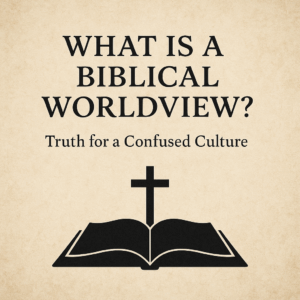⏱️ Estimated Reading Time: 6 min read
 Sanctify them in the truth; your word is truth. (John 17:17)
Sanctify them in the truth; your word is truth. (John 17:17)
In John 17 we find what is known as Jesus’ high priestly prayer. This supplication to God is divided into three sections, one focused on Jesus himself, the second on Jesus’ disciples, and the final section devoted to all future generations of believers. One element of this prayer that is contained in the plea for the disciples is “Sanctify them in the truth; your word is truth.” While clearly a request for those disciples that would soon be sent into the world to preach the message of the gospel, the need for truth and to be sanctified in truth applies to all believers. Furthermore, knowing where the source of truth is located is also of great importance.
A term such as sanctification is often one of those theological terms that is misunderstood and misapplied. The word translates as sanctify is the Greek verb hagiazō meaning “to separate from profane things and dedicate to God”. This idea of something or someone being set apart to God is found throughout Scripture. Items in the temple were set apart. The people of Israel were set apart from all the other nations. In fact, anything called by God or used in service to God is set apart.
John Frame provides a great definition of sanctification noting it is “God’s work to make us holy.”[1] We can see in this definition that sanctification is not an act of our own personal effort, but rather it is a divine work, one completed in our lives by God. Frame further elaborates on sanctification commenting that “sanctification is not only a past event, but also an ongoing process. It begins in regeneration, and we can think of sanctification as the outworking of the new life given in regeneration. In that ongoing process, God works in us, but he also calls us to work out salvation. It is all of God, for all things are of God. Sanctification is a work of the Holy Spirit on the basis of Christ, who is our sanctification.”[2] There is definitely a lot to chew on when it comes to sanctification. I want to focus specifically on the work of the Holy Spirit in this process as it relates to Scripture, the source of truth.
We live in a work where truth is more often than not viewed as relative to the individual. Truth is defined by the pursuit of personal passions or by popular vote. As believers, we live by a completely different construct, one that views truth as rooted in God who is eternal, and His Word which contains guidelines that do not change with the passing whims of society.
As noted by John Frame, sanctification is a work of God completed in our lives by the Holy Spirit. In order to understand what that work includes as it relates to John 17:17 and the request made by Jesus, we have to journey back to the Old Testament:
“This is the covenant I will make with the people of Israel after that time,” declares the LORD. “I will put my law in their minds and write it on their hearts. I will be their God, and they will be my people.” (Jer. 31:33)
This covenant is what is referred to in Hebrews 10:16 meaning the covenant noted in Jeremiah applies to all those called by God to be His. Those who are His will have something written on their hearts. What is to be written on our hearts you might ask? It is God’s law, His holy Word. This is why when Jesus asked for believers to be sanctified in truth, He followed that request up with the declaration of God’s Word being the source of that truth.
If we claim to be a people of God who are interested in pursuing truth, we must be committed to rooting ourselves in the source of truth – God’s Word. Far too often, the pursuit of truth is stifled by personal opinion or even some traditions we hold dear that are not always founded in the Word of God. Perhaps this is why Scripture commands us to “test everything; hold fast what is good.” (1 Thess. 5:21) Testing everything does not mean we are to test based on what our favorite author, blogger, pastor, or scholar has stated. The basis for testing everything is the only unfailing source of truth – God’s Word. The canon of Scripture is the rule and standard for how the truth is to be defined. Furthermore, the Holy Spirit is not writing on our hearts the words of our favorite author, blogger, pastor, or scholar. Conversely, it is God’s law, His Word that is written on our hearts so that we may be sanctified in truth. Those set apart by God should always look to that which has been provided by God (Scripture) when we want to know what is true and what is false.
My challenge to you today is to focus on examining everything in light of God’s Word. If you desire to be holy as God is holy, part of that process is the uprooting of man’s word and the planting and growing of God’s Word in your heart. We have to be willing to admit that some things that have taken root in our hearts and minds is not based in sound doctrine. We are told in Scripture what to do with anything that is not sound doctrine – it is to be rejected.
Get in the Word and start stripping away through the work of the Holy Spirit that which does not belong as part of sound theology. Hold fast to truth and dig deep into the Word of God. We are a people set apart to God for holiness. Let us never hold dear to our hearts that which is not holy and from God regardless of how comforting that particular belief system may be to us. If it is not rooted in Scripture it is not from God and is affecting our approach to God’s Word.
Be sanctified in truth! God’s Word is truth!
References:
[1] John Frame, Systematic Theology (Phillipsburg: P&R Publishing, 2013), 983.
[2] Ibid., 987.




